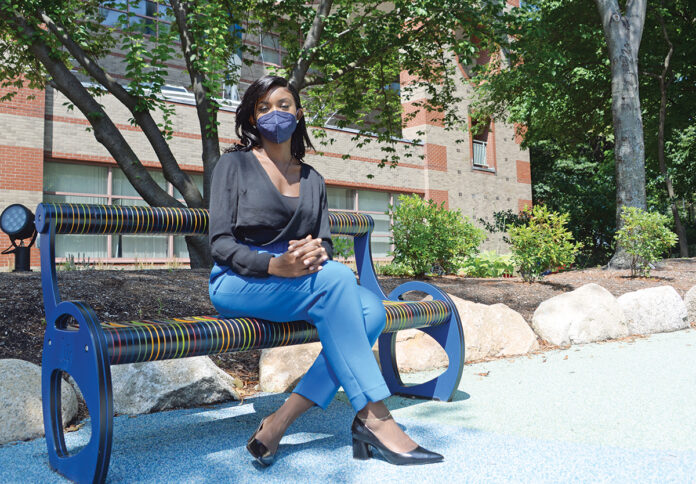Pediatric health care isn’t immune from racial inequities.
That’s the starting point for a new grant-funded program at Hasbro Children’s Hospital in Providence and 11 other pediatric facilities across the country, aiming to transform children’s health care by adopting “anti-racist practices” and partnering with parents to develop strategies for a more family-centered approach.
The pediatrician behind Hasbro’s involvement with the initiative said it’s time for health care organizations to take action to eliminate implicit bias and disparate health care outcomes.
“Realistically, we have known about racial disparities in health care for years,” said board-certified general pediatrician Dr. Olutosin Ojugbele. “It has been documented in research. Communities and community organizers have been working toward health equity for a long time. It just has finally gotten a national platform that it hasn’t had before.”
Hasbro Children’s Hospital, operated by Lifespan Corp., was one of 12 competitively selected pediatric facilities that committed to refining their efforts, working together to advance family-centered pediatrics and contributing to the accelerated adoption of anti-racist strategies. It’s part of a national effort called “Accelerating Child Health Transformation,” led by the nonprofit Center for Health Care Strategies and supported by grant funding from the Robert Wood Johnson Foundation.
Over nine months, program leaders will enlist community participants to collaborate in discussions on health disparities, identify health-related social needs, forge equitable partnerships between families and providers, and they will discuss what can be done to support better health and well-being for children.
‘It just has finally gotten a national platform that it hasn’t had before.’
DR. OLUTOSIN OJUGBELE, Hasbro Children’s Hospital pediatrician
The Center for Health Care Strategies said it aims to share findings and distill lessons from Hasbro and the other participating pediatric health settings – including hospitals in New Jersey, Colorado and California. The organization said it also expects to publish a “pediatric transformation tool kit” as a resource for pediatric hospitals.
Ojugbele said for hundreds of years, health care disparities in the U.S. have afflicted Black people. She referred to studies showing higher rates of pregnancy-related deaths for Black women. And a 2016 study at the University of Virginia found that almost half of first- and second-year medical students thought Black people had thicker skin and perceived less pain than white people. Also, a 2019 study published by the American Journal of Emergency Medicine dissected data from studies on pain management, finding that Black patients were 40% less likely to receive medication for acute pain compared with white patients.
Still, there’s been limited research into the topic in the field of pediatrics, Ojugbele said.
“In that population, it tends to be under-researched,” Ojugbele said. “However, we have plenty of research in adult populations about the negative effects.”
Ojugbele said there are many reasons why health disparities exist among persons of color.
“This is based on societal structures that propagate our education system, the way we are socialized as children and other factors,” Ojugbele said. “It’s challenging to unlearn this. That’s why this field of thinking of anti-racist practice is so important. It’s not simply about saying that we’re not racist, but actively employing measures to make sure we are anti-racist.”
Efforts to promote racial equity in hospitals are also taking place in the Care New England Health System hospitals, where Dionne Wright Poulton was appointed the company’s chief diversity officer more than a year ago.
Poulton said confronting racial bias in the workplace, including unintended or unconscious bias, can be a “difficult topic,” especially in health care where most people have good intentions.
“I really firmly believe that no one goes to work in this profession to hurt anyone intentionally. I refuse to believe that,” Poulton said. “But we all have biases and make associations and categorize others to make sense of the world and our experiences. I try to approach it in a nonthreatening way and say, ‘We’re all on the same boat.’ But sometimes, if we don’t practice self-reflection and don’t associate with people who are not like us, the more likely we are to have biases.”
Ojugbele, a New York native and daughter of Nigerian immigrants, who was the first in her family to become a doctor, said she expects the Accelerating Child Health Transformation initiative to not only benefit Black and other minority patients, but it will also have a “trickle down” effect to advance the cause of all pediatric patients.
“Health equity is not about giving advantages to certain populations,” Ojugbele said. “It’s recognizing the historical impact of racism on the health of Black and brown people. And doing everything we can to correct that is simply human decency and does not marginalize any other population. If anything, it uplifts our society as a whole.”
Marc Larocque is a PBN staff writer. Contact him at Larocque@PBN.com.










